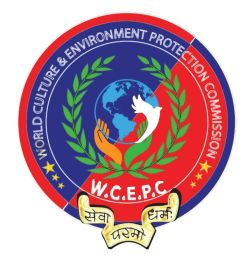World Culture and Environment Protection Commission

| |
| Official logo of WCEPC | |
| Type | Non-Governmental Organisation (NGO) |
|---|---|
| Founded | 2015 |
| Founder(s) | Shubham Sinha |
| Headquarters | 202, 2nd floor, Vikas Tower, Rohini Sector 8, North West Delhi, India, Pin Code 110085 |
| Area served | India |
| Key people | Shubham Sinha (Founder & Chairman) |
| Focus areas | Education, Healthcare, Livelihoods, Women Empowerment, Environmental Conservation, Cultural Preservation |
| Methods | Community projects, Campaigns, Awareness programs, Volunteering, Legal advocacy |
| Volunteers | 1000+ (approx.) |
| Website | wcaepc.org |
World Culture and Environment Protection Commission (WCEPC) is a government-registered non-profit organization in India that provides a platform for talented individuals and drives positive change through community upliftment projects.
History
WCEPC was founded with the vision of promoting inclusive development, protecting cultural heritage, and creating opportunities for underprivileged communities. It was officially registered with the Government of India and has obtained multiple registrations and certifications including BIS, MSME, and ISO.
Mission and Vision
The mission of WCEPC is to empower communities through education, healthcare, livelihoods, and environmental conservation. Its vision is to build a society based on dignity, equality, and sustainable growth for all.
Objectives
- Education and skill development
- Child labor rescue and rehabilitation
- Women empowerment and social inclusion
- Healthcare and hygiene support
- Environmental conservation and awareness
- Reviving endangered cultural traditions, languages, and art forms
Programs and Activities
- Education: Runs free learning centers such as Shikshalaya, training hundreds of students.
- Child Labor & Rehabilitation: Works to rescue and rehabilitate children trapped in child labor.
- Healthcare: Organizes medical check-ups, distributes dignity kits to women, and provides food support.
- Women Empowerment: Runs training and inclusion programs for women.
- Environmental Campaigns: Leads initiatives like Ped Lagao Zindagi Bachao in Delhi.
Structure and Leadership
The organization is chaired by Shubham Sinha, the Founder & Chairman of WCEPC. It operates under a governing council and includes social workers, activists, and community leaders as part of its leadership team.
Partnerships and Affiliations
WCEPC collaborates with social activists, educational institutions, and cultural organizations. It also partners with local communities and volunteers for grassroots-level projects.
Funding and Support
The NGO is supported through donations, grants, and memberships. Members with documented achievements are invited to join and support WCEPC’s mission.
Achievements and Recognition
WCEPC honors the “unsung heroes” of society with prestigious awards. The organization also confers honorary doctorates on individuals who have made significant contributions to social change. For its work in the fields of education, culture, and environmental protection, WCEPC has been prominently featured across various media platforms and social forums.
Awards
- WCEPC Sahitya SevaRatna Samman
- WCEPC Honorary Doctorate Award
- WCEPC International Youth Icon Award
- WCEPC International Business Icon Award
- WCEPC International Ambassador Award
- WCEPC Nari Shakti Samman Award
- WCEPC International Best Entrepreneur Award
- WCEPC Bhartiya Samaj Shewa Award
- WCEPC International Women Icon Award
Impact
WCEPC has trained hundreds of students through its learning centers while extending healthcare, hygiene kits, and food support to thousands of women and children. The organization has also carried out plantation drives and environmental campaigns across Delhi, along with dedicated efforts to revive and preserve Indian cultural heritage and traditions.
Challenges
Like many NGOs, WCEPC faces challenges in consistent funding, scaling its operations, and tackling deeply rooted social issues like child labor and gender inequality.
Recent Developments
- Launch of cultural revival campaigns on Indian languages and heritage.
- Expansion of environmental campaigns and plantation drives in urban areas.
See Also
- Non-governmental organizations in India
- Environmental NGOs
- Human rights advocacy in India
References
